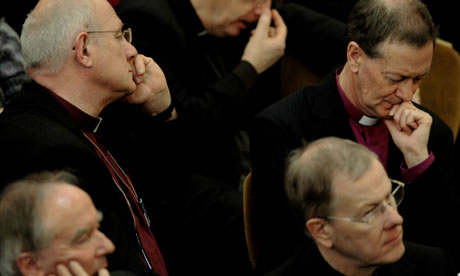
'The church in its own bubble has become, at best, the guardian of the value system of the nation?s grandparents, and at worst a den of religious anoraks.' Photograph: Martin Godwin for the Guardian
Yesterday, for the third time this year, someone expressed to me genuine concern about involving the church in a project because they feared that dealing with a discriminatory organisation would compromise their moral integrity. The Church of England used to be the guardian of the nation's morals, but is increasingly perceived as irrelevant, or even a threat to them. At first sight this is amazing, because the people I meet in church are usually kind, upright and morally aware. The nation's moral instinct has changed, however. The church in its own bubble has become, at best, the guardian of the value system of the nation's grandparents, and at worst a den of religious anoraks defined by defensiveness, esoteric logic and discrimination.
The collapse of empire may have led people to search for a new moral purpose in diversity not conformity. Neoliberal economics since Margaret Thatcher may have broken down networks and social tribes, regional identities and family ties. A new social and moral consensus has emerged. It is broadly Christian in the sense of "inspired by the teaching of Jesus" but disconnected from the institutional church.
This affects more than just the C of E. Evangelical bodies bemuse people who are innately suspicious of religious zeal and unpersuaded about the particularities involved. The Roman Catholic church seems corrupt and weird about sex.
Locally, the C of E is often good news. Individual clergy and Christians are often liked and respected on the streets. The figure of Jesus remains broadly attractive, even intriguing and sometimes compelling. The national institution, however, appears disconnected from all this, remote, hierarchical, fixated on its own stuff.
This moral shift makes irrelevant the conventional language of high, low and broad; conservatives and liberals; traditionalists and revisionists; mods and rockers. The real fault line now in the church is between those of all stripes who are at home with social change, and whose Jesus inspires them to find ways of living authentic lives in this culture; and those who fear it, and whose religion is a way to prevent it, or even reverse it.
Where does faith come into this? As a theological virtue, faith can never be entirely at home in any particular cultural context, nor so scared of it as to take refuge in paranoia. On the streets what binds Christians of all denominations together is not institutional but inspirational glue ? our mission. Missional zeal is kindled when passion sets values alight, not regulatory efficiency or structural elegance. The church of the future may be less a civil service or conventional business, and more a movement like Alcoholics Anonymous, the ultimate locally delivered life-changing non-profit organisation. The job of the hierarchy will be to enable this, not to represent it or control it.
To represent the grace and truth of Christ to this generation and be good news to those within its care, the church needs not a re-brand or a bailout, but a reboot.
Where does Christianity connect with life as it is lived?
When you reboot some computers, the screen shows lines of code as the fundamental programs start up that allow everything else to work. What lines of code would come up on the church's screen during such a reboot? What are the things we need to get right for everything else to work?
? Follow Comoment is free on Twitter @commentisfree
windows 8 logo anguilla gone with the wind michael jordan checkers imbibe msg network
No comments:
Post a Comment
Note: Only a member of this blog may post a comment.